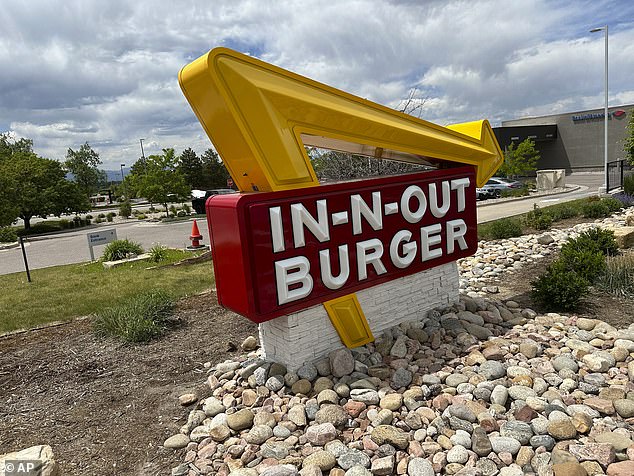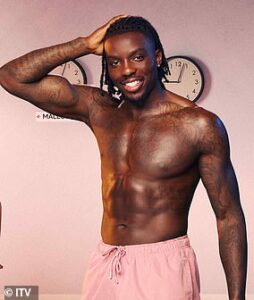
A black In-N-Out Burger employee was allegedly racially harassed by his bosses after he refused to trim his sideburns, according to a new lawsuit.
Elijah Obeng, 21, claims he suffered severe emotional distress and was wrongfully terminated after he was targeted by management over the popular burger chain’s dress code, the lawsuit, filed Thursday with the Compton Superior Court, read.
Obeng, who worked at the Compton location for nearly four years after graduating high school, was soon informed he had to change his hairstyle as it started to grow.
The chain requires all staff to wear company-issued hats with their hair tucked in. Males employees must also be clean-shaven, the lawsuit detailed.
After he was told he had to alter his hairstyle, Obeng started wearing braids, but management still found an issue with his sideburns – something that is part of his ‘racial and cultural identity,’ per the lawsuit.
Shortly after his boss started to complain about his facial hair, which Obeng ‘found humiliating and discriminatory,’ he quickly realized a drastic change in his work environment.
According to the legal filing, Obeng started ‘experiencing different treatment’ afterward, including being reprimanded for not attending meetings and for ‘minor infractions.’ His coworkers ‘were not disciplined for similar conduct,’ it added.
Tensions soon rose to a boiling point when Obeng clocked in for his shift on May 25, 2024 as his supervisor asked him to go home and shave his sideburns before returning back to the fast food restaurant, the lawsuit stated.

Elijah Obeng, 21, claims he suffered severe emotional distress and was wrongfully terminated after he was targeted by management over his sideburns while working at the chain’s Compton location. (Pictured: File photo)

After he was told he had to alter his hairstyle, Obeng started wearing braids, but management still found an issue with his sideburns – something that is part of his ‘racial and cultural identity,’ per the lawsuit. (Pictured: Stock image)
At the time, Obeng was told to do so by his boss ‘in full view of his coworkers,’ leading him to ‘feel publicly humiliated,’ the legal document said.
Instead of returning back to his shift that day, Obeng texted his supervisor, letting them know he would clock back in for his next scheduled shift because he believed the particular incident was ‘a discriminatory and unnecessary grooming requirement,’ according to the lawsuit.
Just a few days after, Obeng was fired from the job ‘due to his protected traits and in violation of public policy,’ the lawsuit read.
Despite his claim, In-N-Out said Obeng was actually let go because of ‘prior write-ups,’ not because of ‘his natural hair’ and the company’s ‘resistance to discriminatory policies,’ it continued.
The suit said the burger chain allegedly violated the CROWN act, also known as Creating a Respectful and Open Workplace for Natural Hair.
In California employers are prohibited from discriminating against staffers based on their hair texture or style, per the CROWN act.
‘This policy disproportionately burdened Black employees whose natural hair may not conform to such grooming standards,’ the lawsuit read.
Because of what he allegedly experienced at the hands of his former employers, Obeng has gone on to suffer ‘anxiety, humiliation, and loss of dignity,’ per the lawsuit.
He has demanded that In-N-Out pay $1 million in compensatory damages, $2 million for emotional distress and $200,000 for back or front pay.

The suit said the burger chain allegedly violated the CROWN act, also known as Creating a Respectful and Open Workplace for Natural Hair. (Pictured: File photo)
He has also demanded that punitive damages be proven at a trial, the lawsuit said.
Daily Mail contacted Obeng, his lawyer and In-N-Out for comment.
The term sideburns was first coined by Ambrose Burnside, a Union general who sported the unique facial hair.
Sideburns really became popular in the 1960-1970s as hippies and rock stars hopped on the trend.
For black men specifically, facial hair is more than a fashion statement as it is symbolizes cultural legacy and identity.
Throughout the 60s and 70s sideburns, afros and beards became popular as black men sported them to express their pride and resistance.
Key figures, including human rights activist Malcom X and Black Power Movement leader Stockely Carmichael, often influenced grooming choices for men in the black community.
From the 70s to the 80s, sideburns became part of a larger story as they became tied to soul, disco and funk performers, including Marvin Gaye, Isaac Hayes and Curtis Mayfield.





